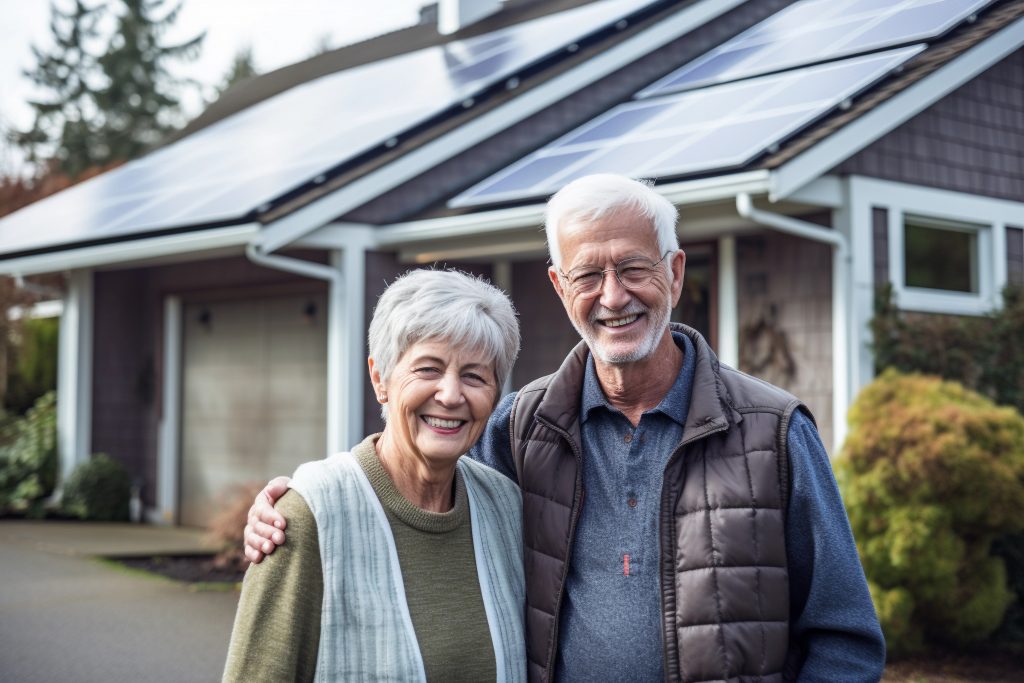As the global population ages, the concept of sustainable living becomes increasingly crucial. For seniors, this shift transcends the mere act of minimizing environmental footprints; it’s about nurturing a legacy of vitality and resilience for the generations to come.
This guide explores practical ways for seniors to live more sustainably, focusing on choices that promote environmental health without sacrificing comfort or quality of life.
- Energy-Efficient Homes
Creating energy-efficient homes is a vital step towards achieving a sustainable lifestyle, especially for seniors looking to decrease their environmental footprint.
Upgrading to energy-efficient appliances is a straightforward yet effective measure, as these appliances use less electricity and water, leading to lower utility bills and reduced resource consumption. LED lighting is another key change; these lights use a fraction of the energy of traditional bulbs and last much longer.
Perhaps the most impactful addition to an eco-friendly home is the installation of a solar panel. Solar energy systems harness the power of the sun, a renewable energy source, to generate electricity. This not only decreases dependence on fossil fuels but can also offer significant savings over time.
By focusing on these changes, seniors can create homes that are not only more sustainable but also more cost-effective in the long run.
- Sustainable Gardening
Sustainable gardening offers seniors a chance to connect with nature while contributing positively to the environment. This practice involves growing one’s own food, which reduces the carbon footprint associated with transporting produce from farm to supermarket to home.
Furthermore, composting kitchen and garden waste turns potential landfill material into rich, nutritious soil, enhancing garden health without the need for synthetic fertilizers. Composting also helps reduce methane emissions, a potent greenhouse gas that contributes to global warming.
By adopting sustainable gardening practices, seniors not only gain the physical and mental health benefits of gardening but also contribute to a more sustainable and self-sufficient lifestyle.
- Green Transportation
The shift towards green transportation is essential in reducing global carbon emissions. For seniors, this can mean choosing vehicles that have a lower environmental impact, such as electric or hybrid cars, which produce fewer emissions compared to traditional gasoline vehicles.
Car-sharing programs and public transportation offer additional ways to reduce individual carbon footprints by decreasing the number of vehicles on the road.
For those living close to amenities, walking or cycling is an eco-friendly transport option and provides significant health benefits, including improved cardiovascular health and increased physical strength.
Embracing these green transportation options can greatly contribute to environmental preservation efforts.
- Water Conservation
Conserving water is crucial in the fight against climate change and in preserving this essential resource for future generations. Seniors can play a significant role in this effort by implementing water-saving techniques in their homes.
Installing low-flow toilets and showerheads can drastically reduce water usage without impacting the quality of life. Promptly repairing leaks prevents the wastage of potentially hundreds of gallons of water a year. Collecting rainwater in barrels for use in gardening is another effective strategy, reducing the demand for treated municipal water.
These practices contribute significantly to eco-friendly living by minimizing water waste.
- Eco-Friendly Products
Opting for eco-friendly products is a simple yet effective way for seniors to support environmental sustainability. Products made from sustainable or recycled materials not only reduce the depletion of natural resources but also often have a smaller environmental footprint in terms of production and disposal.
By choosing reusable over single-use plastics, such as shopping bags, water bottles, and food containers, seniors can help combat the growing problem of plastic pollution, which affects wildlife and ecosystems worldwide.
Seeking out eco-friendly products encourages manufacturers to prioritize sustainability in their product lines, leading to broader environmental benefits.
- Minimalism And Decluttering
The minimalist lifestyle, characterized by simplicity and mindfulness about possessions, aligns well with sustainable living principles. For seniors, decluttering can lead to a more organized and peaceful living space, reducing stress and improving quality of life.
Donating unwanted items extends their lifespan and reduces the need for new resources to be used in manufacturing. Recycling materials instead of discarding them decreases landfill waste and the environmental impact associated with waste disposal.
By adopting a minimalist approach, seniors can significantly reduce their environmental footprint while promoting a culture of sustainability and resource conservation.
- Community Engagement
Engaging with community environmental initiatives amplifies the impact of individual actions. Seniors can play a pivotal role in their communities by participating in local clean-ups, which help preserve natural beauty and prevent pollution from harming wildlife.
Contributing to community gardens not only promotes local food production but also fosters a sense of community and cooperation. Advocating for renewable energy and sustainable practices within local governance can lead to broader environmental policy changes.
Through these efforts, seniors contribute to creating a more sustainable community, inspiring others to act for the environment.

Conclusion
Adopting an eco-friendly lifestyle in senior living involves making conscious choices towards sustainability. From energy-efficient homes equipped with solar panels to engaging in community environmental efforts, each action contributes to a greener, healthier planet.
By embracing these practices, seniors can lead by example, inspiring others to consider the environment in their daily lives, ensuring a sustainable future for all generations.















